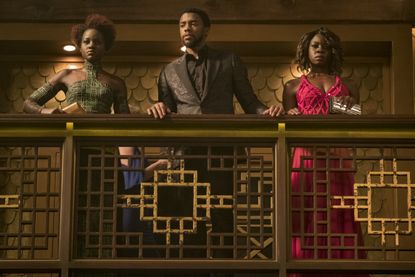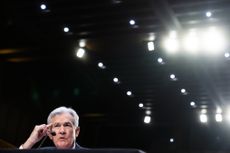Inside Black Panther's all-black universe
This movie is a conversation between black people — and that's what makes it so good


What sets Black Panther apart from our vast stable of superhero films is that, beyond being entertaining and beautiful, it manages every aesthetic and narrative choice with a pained intelligence that cuts to the contradictions it has to traverse. Director Ryan Coogler doesn't just celebrate black might, black technology, black women, and black men; he organizes the celebration around that old dogwhistle: "black-on-black violence." This is a movie so marvelously and normatively black that the white adversary — played by a maniacally colorful Andy Serkis — fails to arouse much interest. His premature death announces that this is not a medicinal "sermon" for white people; it's a conversation between black people.
That conversation is thrilling and rich and substantive and hard: What should happen when an African Black Panther fights an Oakland Black Panther? The film takes on isolationism, diaspora, and the case for total war. It ends with an ostensible third-world country ethically (rather than ethnically) colonizing a first-world city in order to rescue its neglected children. Freed to think strategically rather than reactively about America — Wakanda's technological superiority to and distance from the United States makes the country almost ancillary — Black Panther allows its characters to clash over philosophies of governance without having the terms of that disagreement set by the usual de facto antagonist.
The story begins with a transfer of power: The king of the fictional African country of Wakanda was murdered and his son, T'Challa (Chadwick Boseman), is to take his place as the new king and Black Panther. T'Challa feels guilty for not adequately protecting his father, and he'll eventually have some painful epiphanies about other men in his circle. His first mission as king is to finally capture Ulysses Klaue, a South African arms dealer who stole a stash of vibranium, the unique and precious metal that makes Wakanda run. T'Challa's friend and second-in-command W'Kabi (Daniel Kaluuya) sees this as a test: Will the young king be able to do what his father couldn't — capture Klaue?
Subscribe to The Week
Escape your echo chamber. Get the facts behind the news, plus analysis from multiple perspectives.

Sign up for The Week's Free Newsletters
From our morning news briefing to a weekly Good News Newsletter, get the best of The Week delivered directly to your inbox.
From our morning news briefing to a weekly Good News Newsletter, get the best of The Week delivered directly to your inbox.
Here's what's interesting about this movie: Rather than honor W'Kabi's doubts about T'Challa, settle this issue, or resolve the ruptures in the Black Panther's other relationships with various men, the movie drifts away from these familiar plot structures. Instead of charting T'Challa's learning arc as king through his ability to garner masculine approval, the film foregrounds and cements T'Challa's affective and political bonds with women. His main allies throughout are his ex-girlfriend Nakia (Lupita Nyong'o), his sister Shuri (Letitia Wright), and his mentor and general Okoye (Danai Gurira). That stays true — shockingly so. They never get excluded from the action. They never become secondary. Plus, they're funny: As T'Challa's technology wizard and scrappy sibling — she rightly addresses a CIA agent as "colonizer" — Letitia Wright's Shuri delivers as much comic relief as she does expertise about the magical metal vibranium.
Even Black Panther's special effects seem like they're commenting on the movie's exciting premise of a specifically African technology: Characters are introduced by rendering them in a black powdery medium that evokes both cutting-edge 3-D printing technology and the sculptural indeterminacy of sand. The same is true of the clothes: Costume designer Ruth E. Carter creates a Wakandan aesthetic that's pointedly non-Western, but shot so as to convince the viewer of its absolute normalcy. The female elite army uniforms are legibly African, clearly designed for female fighting bodies, and magnificent without being "sexy." Angela Bassett's costume as Ramonda, T'Challa's mother, is remarkable. Its otherworldly architectural splendor scans as regal in the style of Queen Elizabeth I.
Cinematically, it feels like Coogler is sampling his actors' other work and incorporating it into an all-black universe. There are echoes everywhere of the cinematic world many of these actors occupied before they were allowed to inhabit this all-black world. We first encounter Lupita Nyong'o's Nakia when she's pretending to be one of a group of women kidnapped by a Boko Haram-like group, and it's healing to see the woman who endured that brutal whipping scene as Patsey in Twelve Years a Slave emerge as a liberator. There's a similar sense of relief in watching Chadwick Boseman — who last year played Thurgood Marshall in a film when he was literally silenced, forbidden from speaking in the courtroom — play a king.
Other references are less comforting: Michael B. Jordan is of course known for playing Oscar Grant, the 22-year-old man shot dead by BART police while face-down and hand-cuffed, in Coogler's Fruitvale Station. In Black Panther, he plays Erik Killmonger with a wounded, scabbed-over rage that specifically references the narrow dreams a kid from Oakland is allowed to have. It's lacerating. The echoes are impossible not to hear. Sterling K. Brown brings some of Christopher Darden's conflicted sense of justice (in The People V. O.J. Simpson) to his role as N'Jobu, who betrays one community in order to serve another. And given his character's experience in Get Out, it seems entirely reasonable for Daniel Kaluuya's character W'Kabi to be suspicious of outsiders.
This movie has a deep bench of talent. Winston Duke deserves particular praise for playing M'Baku — a problematic figure in the comics sometimes described as "Man-Ape" — with hilarious confidence that translates the more overtly racist tropes into self-conscious performances specifically intended to intimidate the one white observer.
The film does have a few problems: The role of the CIA is bizarrely undertheorized — I kept expecting a twist that never came — and there's a perplexing vacuum at the end of the movie where it seemed like an apology everyone agreed was warranted ought to have appeared. But these are the kinds of flaws you get when you attempt something huge and pull most of it off. Black Panther's failures, like its triumphs, are more Shakespearean than superheroic.
Create an account with the same email registered to your subscription to unlock access.
Sign up for Today's Best Articles in your inbox
A free daily email with the biggest news stories of the day – and the best features from TheWeek.com
Lili Loofbourow is the culture critic at TheWeek.com. She's also a special correspondent for the Los Angeles Review of Books and an editor for Beyond Criticism, a Bloomsbury Academic series dedicated to formally experimental criticism. Her writing has appeared in a variety of venues including The Guardian, Salon, The New York Times Magazine, The New Republic, and Slate.
-
 'New arrivals are more than paying for themselves'
'New arrivals are more than paying for themselves'Instant Opinion Opinion, comment and editorials of the day
By Harold Maass, The Week US Published
-
 6 stylish homes in Portland, Oregon
6 stylish homes in Portland, OregonFeature Featuring a wall of windows in Collins View and a historic ballroom in Portland Heights
By The Week US Published
-
 What's next for US interest rates?
What's next for US interest rates?The Explainer Stubborn inflation forestalls anticipated rate cuts
By Becca Stanek, The Week US Published
-
 Walter Isaacson's 'Elon Musk' can 'scarcely contain its subject'
Walter Isaacson's 'Elon Musk' can 'scarcely contain its subject'The latest biography on the elusive tech mogul is causing a stir among critics
By Theara Coleman Published
-
 Welcome to the new TheWeek.com!
Welcome to the new TheWeek.com!The Explainer Please allow us to reintroduce ourselves
By Jeva Lange Published
-
 The Oscars finale was a heartless disaster
The Oscars finale was a heartless disasterThe Explainer A calculated attempt at emotional manipulation goes very wrong
By Jeva Lange Last updated
-
 Most awkward awards show ever?
Most awkward awards show ever?The Explainer The best, worst, and most shocking moments from a chaotic Golden Globes
By Brendan Morrow Published
-
 The possible silver lining to the Warner Bros. deal
The possible silver lining to the Warner Bros. dealThe Explainer Could what's terrible for theaters be good for creators?
By Jeva Lange Last updated
-
 Jeffrey Wright is the new 'narrator voice'
Jeffrey Wright is the new 'narrator voice'The Explainer Move over, Sam Elliott and Morgan Freeman
By Jeva Lange Published
-
 This week's literary events are the biggest award shows of 2020
This week's literary events are the biggest award shows of 2020feature So long, Oscar. Hello, Booker.
By Jeva Lange Published
-
 What She Dies Tomorrow can teach us about our unshakable obsession with mortality
What She Dies Tomorrow can teach us about our unshakable obsession with mortalityThe Explainer This film isn't about the pandemic. But it can help viewers confront their fears about death.
By Jeva Lange Published